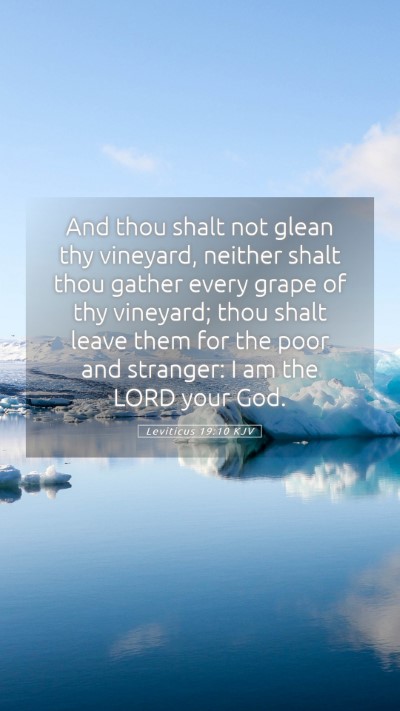Understanding Leviticus 19:10
Leviticus 19:10 states, "And you shall not glean your vineyard, nor shall you gather every grape of your vineyard; you shall leave them for the poor and the stranger: I am the LORD your God." This verse encapsulates a profound biblical principle of compassion and generosity toward those in need.
Verse Explanation
This verse is rooted in the laws given to the Israelites, providing guidance on how they should conduct their agricultural practices. It emphasizes the importance of aiding the less fortunate, promoting social justice and kindness.
Bible Verse Meanings and Interpretations
The insights gathered from public domain commentaries highlight the following key ideas:
- Compassion for the Poor: According to Matthew Henry, this law serves to ensure that the needy are provided for during the harvest season, reflecting God's care for all people.
- Generosity as Divine Command: Adam Clarke explains that leaving the edges of the fields unharvested was not merely a good deed but a divine command to cultivate a spirit of generosity and mitigate poverty.
- Preservation of Community: Albert Barnes notes that this practice promotes a sense of community. It is not just about the individual’s right to gather all of their harvest but recognizing the communal responsibility towards those who are less fortunate.
Historical Context
This directive is set within a larger context of the Mosaic Law, which sought to form a just and equitable society among the Israelites. The agricultural society of the time relied heavily on communal support and assistance for survival.
Application of the Verse
Leviticus 19:10 encourages modern readers to consider how they can apply this principle of leaving resources for the needy in their lives. This could mean:
- Ensuring that charitable acts are included in personal finances.
- Creating systems that allow for the sharing of abundance, whether that be through food pantries, community gardens, or other means.
- Recognizing our responsibility to uplift those around us.
In-Depth Bible Verse Commentary
This verse resonates with themes found throughout both the Old and New Testament. It represents God's unchanging character of love and mercy, encouraging believers to model these attributes in their interactions with others.
Related Cross References
- Deuteronomy 24:19-21: This passage further emphasizes the idea of leaving a portion of the harvest for the poor.
- Matthew 25:35: Jesus speaks of the importance of caring for those in need as an act of serving Him.
- James 1:27: Defines true religion as caring for orphans and widows, paralleling the theme of social justice in Leviticus.
Conclusion
Leviticus 19:10 can be seen as a foundational text that encourages biblical exegesis and an understanding of scripture that transcends time. It calls believers to engage in acts of kindness and generosity, impacting their life choices and overall worldview.
As you explore the meaning of Bible verses like Leviticus 19:10, consider using Bible study tools and resources to deepen your understanding, and engage with bible study groups for community insights on applying these truths to daily life.


